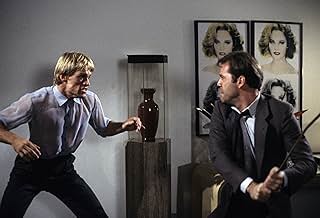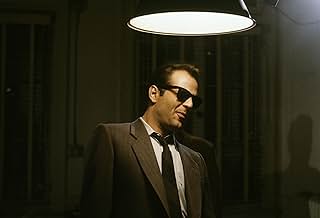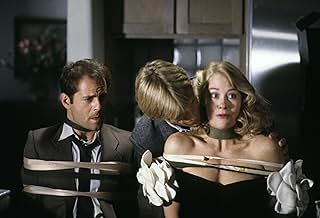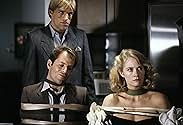एक पूर्व मॉडल और एक स्मार्ट एलेक जासूस के विचित्र मामले जो एक निजी जासूसी एजेंसी का प्रबंधन करते हैं।एक पूर्व मॉडल और एक स्मार्ट एलेक जासूस के विचित्र मामले जो एक निजी जासूसी एजेंसी का प्रबंधन करते हैं।एक पूर्व मॉडल और एक स्मार्ट एलेक जासूस के विचित्र मामले जो एक निजी जासूसी एजेंसी का प्रबंधन करते हैं।
- 6 प्राइमटाइम एमी जीते
- 19 जीत और कुल 60 नामांकन
फ़ीचर्ड समीक्षाएं
Willis and co-star Cybill Shepherd were fabulous and had excellent chemistry. They were ably supported by Allyce Beasley, Curtis Armstrong, Charles Rocket (a brilliant choice for David's brother, who appeared in some episodes), and for several episodes, Eva Marie Saint and the late Robert Webber as Maddie's parents.
The series boasts some phenomenal episodes but when it fell, it fell hard. Ego problems, budget problems, and story direction problems began to weigh it down, and it finally crawled to an end after tons of reruns being shown in prime time when scripts were unable to be delivered. However, the heights hit in the first two seasons or so are unmatched probably by any other series for their creativity and brilliance. Moonlighting remains a wonderful and joyous part of TV history.
A great detective show from my youth. More a comedy than a drama, the humour was great, the relationship and banter between Maddie Hayes (Cybill Shepherd) and David Addison (Bruce Willis) was very engaging and it was simply great fun.
It also launched the career of Bruce Willis, to the show's detriment. Die Hard was released around seasons 3 and 4 and from then on sadly the writing was on the wall for the show as he was clearly destined for bigger things.
By the third episode it was clear they were on to something original, or if not completely original, at least written and executed better than anything else on TV at the time. The Tracy-Hepburn like sparring between Shepherd and unknown actor Bruce Willis, and the sophisticated writing by Caron and the other writers just got better and better as they finished their first half season of ten episodes.
The highlight of that first batch was the celebrated "black and white" episode, "The Dream Sequence Always Rings Twice." In it Maddie and David interview a client who owns a once famous LA nightclub (like the Coconut Grove), which is about to be torn down. There they learn of a mysterious murder that occurred there in the 40's, still unsolved, that revolved around a trumpet player having an affair with the band's married girl singer. The singer's husband was killed and both the trumpet player and the songstress claim the other did the deed. Of course David assumes the woman framed the musician. Maddie feels it was much more likely the sleazy guy did it. Each of them daydream their version of events in 1940's black and white, with Bruce playing the trumpeter and Cybill the singer. Each of their mini-stories works as film noir homage, and the pairing of the two versions come off even stronger. In addition it allowed us to see David and Maddie in a romantic setting without having to put the characters directly into that kind of plot killing situation. The episode won Emmy nominations for everyone involved, including Cybill and Bruce. Bruce won.
Which brings up "the troubles." How many giant egos can one series sustain? Tension began to mount between Shepherd, Willis, and Caron. Cybill was the "star" - but she was essentially playing straight man to Willis. His manic character and split second timing were the force driving the chemistry forward. By the time they were filming the first full season - he was as recognizable as she was. And after years of struggling and starving in New York - he was enjoying every minute of his new found fame.
And then there was Glen Gordon Caron. He was very much a "hands on" producer and had very definite ideas about where he wanted to take the series. His perfectionism frustrated his cast and writers. Several times the crew would begin filming an episode while the writers were still writing. Caron had a commitment to the network for 22 episodes per season. He never delivered more than 20. His shooting regularly went off schedule and over budget. The quality was there on the screen ("Atomic Shakespeare" - a riff on the Taming of the Shrew was practically a movie in and of itself), but the show began to tick off viewers who complained about all the reruns while they waited for a new episode.
As the series moved into its second full season it hit a creative peak:
· The aforementioned Taming of the Shrew
· Big Man on Mulberry Street - with a musical sequence by "Singing in the Rain" director Stanley Donen
· The four Sam and David and Maddie episodes with Mark Harmon as the straight up astronaut whose proposal forces Maddie and David to confront their feelings.
Then it happened. A confluence of events that seemed to drain the show of all its life:
· Maddie and David "did it" - killing off the eternal suspense.
· The writers, tired of all Caron's tirades and very much in demand with all their Moonlighting awards, left the series. Caron had to bring in a fresh crop.
· Cybill Shepherd became pregnant with twins. The timing of the pregnancy would prevent her from filming between September and at least December - a prime production period.
· Glen wrote the pregnancy into the show - and had Maddie flee LA for home - for months. This allowed him to film Shepherd's scenes alone during the summer. Of course with 3000 miles between Maddie and David it's hard to get much zippy chemistry going.
Coming from the creative high of the second season, the letdown in the third year was all the more apparent. By the time they dumped the baby (a miscarriage) at the beginning of the fourth season - the magic was clearly gone. Shepherd and Willis were anxious to move on to more lucrative film projects, and the final season was only a slight improvement over the disappointing previous year.
But, as the nursery rhyme goes - when it was good, it was very very good. In addition to the episodes mentioned above, try to catch some of these on cable:
· "My Fair David" - Maddie bets David can't go through a week without breaking out into some Motown ditty, or making crass sexist comments.
· "Devil in the Blue Dress" with Judd Nelson and Whoopie Goldberg
Shepard, who plays Maddie Hayes, wakes up one morning to find out her accountant has absconded with the fortune she made as a high fashion model. Obviously it was not a stretch for Cybil to adapt to this role! In the course of finding out that she needs to sell everything, she happens in on this little detective agency(Blue Moon), she owns only because it was a great tax writeoff. The staff is morabund, and the head sleuth is a wise cracking obnoxious male chauvenist named David Addison, played by an unknown(at the time) Bruce Willis. The immediate rapport between the two brought viewers back for more. The endless stream of double entendre's, malaprops, and overall office antics made the show lovable and audiences craved for more.
Glenn Gordon Caron's writing and vision had the writers, actors, and directors take license with certain rules in primetime that were never questioned. E.G. In one particular episode Maddie asks David to get more explicit with an explanation and David responds by telling her if they get any more explicit they'll have to move the show to cable. It is precisely these departures from the norm, along with the genius idea to have the two main characters talk to each other AT THE SAME TIME, that made critics and fans follow their every move.
It's probably best to say that this show's run was cut short due to the emergence of Willis as a bonafide star. Once he made his mark on the big screen, in Die Hard, Bruce was looking for ways to exit TV. In interviews he talked of the brutal schedules for TV primetime and the difficulty in exploring the boundaries of his talents and appetite for acting. As the show fragmented the practice of in season repeat episodes was probably accepted more , if not born out of necessity. Expanded roles were given in onscreen time and plots to Allyce Beasley(who played a great Agnes DiPesto) and her Blue Moon boyfriend Herbert Viola, played by Curtis Armstrong. These shows were often almost difficult to watch, through no fault of Beasley and Armstrong, but rather the desire to see Maddie and David cavort as usual.
Reruns have been syndicated and you can find them sometimes, most recently on cable channel BRAVO. If you do see the shows, and they are regularly scheduled, it would be well worth it to look for four of my favorites...the first episode of Moonlighting's second season entitled "Brother Can You Spare A Blond", a later episode when Maddie and David have had one of their innumerable fights and they are both interviewed by Rona Barrett in an attempt to reconcile their differences, the episode that co-stars Dana Delaney as the ex-fiance that jilted David, and a classic show guest hosted by Orson Welles shot just before Welles' death. The show signifies the great love/hate relationship between the two main characters and is brilliantly shot in both color and black and white. I think you'll get the spirit and essence of this show if you see any of these.
क्या आपको पता है
- ट्रिवियाBruce Willis made Die Hard (1988) while starring in this show. By the time the series ended, the movie was available on VHS. In one of the last episodes, Willis and a love interest walk past a video rental store while an employee tears a "Die Hard" poster down from the window.
- भाव
Security Officer: I'm sorry, but you're not on the guest list.
David Addison: That's because we're not guests. We're looking for a man with a mole on his nose.
Security Officer: A mole on his nose?
Maddie Hayes: A mole on his nose.
Security Officer: [to Maddie] What kind of clothes?
Maddie Hayes: [to David] What kind of clothes?
David Addison: What kind of clothes do you suppose?
Security Officer: What kind of clothes do I suppose would be worn by a man with a mole on his nose? Who knows?
David Addison: Did I happen to mention, did I bother to disclose, that this man that we're seeking with the mole on his nose? I'm not sure of his clothes or anything else, except he's Chinese, a big clue by itself.
Maddie Hayes: How do you do that?
David Addison: Gotta read a lot of Dr. Seuss.
Security Officer: I'm sorry to say, I'm sad to report, I haven't seen anyone at all of that sort. Not a man who's Chinese with a mole on his nose with some kind of clothes that you can't suppose. So get away from this door and get out of this place, or I'll have to hurt you - put my foot in your face.
- क्रेज़ी क्रेडिटBetween the closing credits of episode 3.9, "The Straight Poop", about 5 minutes of bloopers from previous episodes are shown.
- कनेक्शनFeatured in The 37th Annual Primetime Emmy Awards (1985)
टॉप पसंद
- How many seasons does Moonlighting have?Alexa द्वारा संचालित
विवरण
- रिलीज़ की तारीख़
- कंट्री ऑफ़ ओरिजिन
- भाषा
- इस रूप में भी जाना जाता है
- Das Model und der Schnüffler
- फ़िल्माने की जगहें
- ABC Entertainment Center - 2040 Avenue of the Stars, Century City, लॉस एंजेल्स, कैलिफोर्निया, संयुक्त राज्य अमेरिका(exterior - David & Maddie's detective agency building)
- उत्पादन कंपनियां
- IMDbPro पर और कंपनी क्रेडिट देखें
- चलने की अवधि45 मिनट
- रंग
इस पेज में योगदान दें























